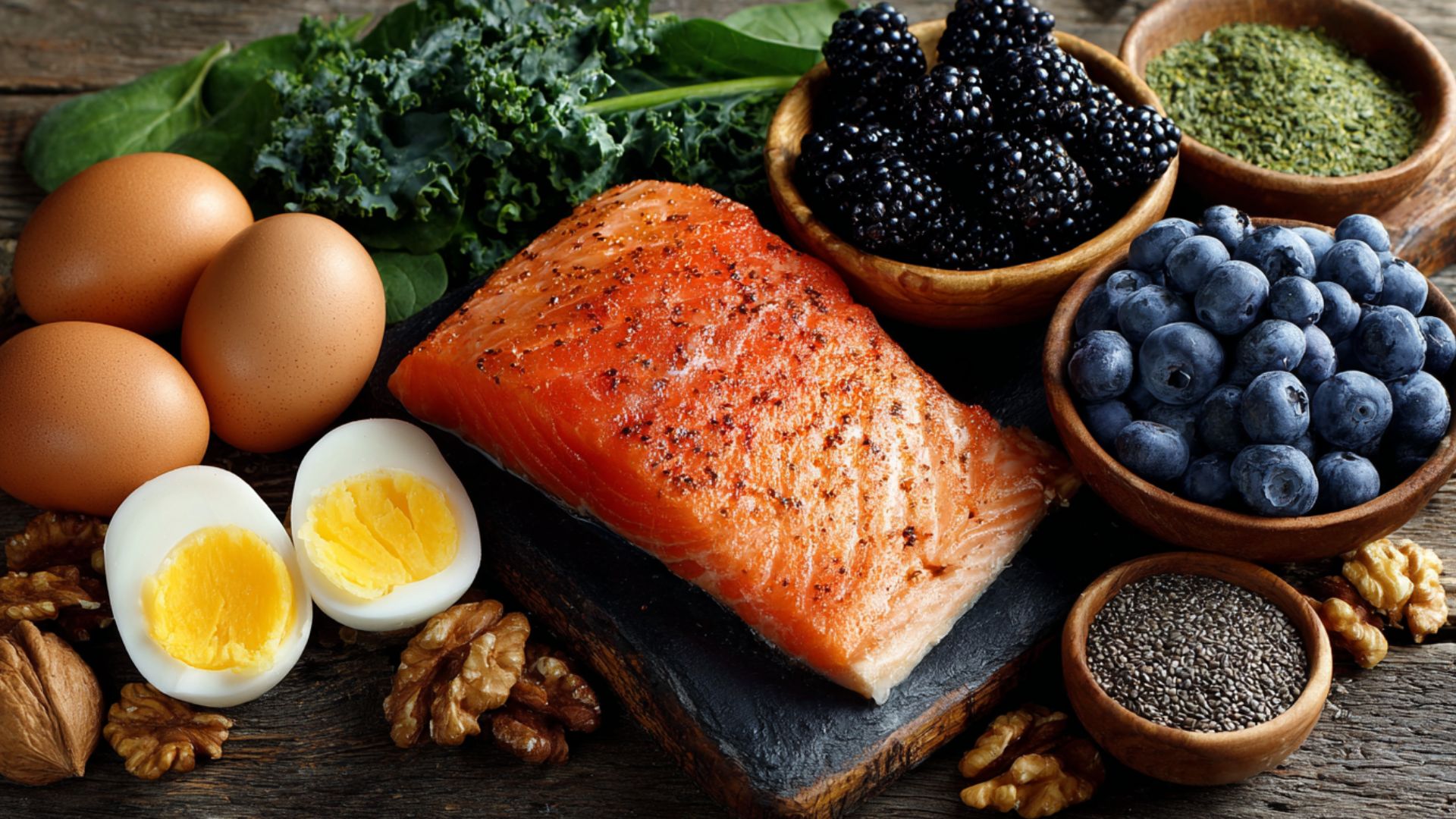Your fork holds the power to protect your brain from devastating decline. Every meal you eat either nourishes your mind or slowly damages the neurons that control your thoughts, memories, and personality. The frightening truth is that millions of people unknowingly starve their brains while feeding their bodies, leading to preventable memory loss and cognitive decline.
Certain foods can actively support brain health, protect against age-related decline, and enhance cognitive function in remarkable ways. These neuroprotective foods list items that work like medicine for your mind, delivering essential nutrients that keep your brain sharp and resilient. Research shows that people who eat brain-healthy diets maintain better memory, clearer thinking, and stronger mental performance throughout their lives.
Brain healthy nutrition isn’t just about preventing problems – it’s about unlocking your mind’s full potential. The right foods can improve your focus today while building protection against Alzheimer’s disease, dementia, and other neurological conditions that destroy lives and tear families apart.
This article will reveal the top neuroprotective foods that should be on your plate every day. You’ll discover how simple dietary changes can enhance your memory, sharpen your mental clarity, and safeguard your brain’s long-term performance. Don’t let poor nutrition rob you of your most precious asset – your mind.
Why Brain-Friendly Nutrition Matters More Than You Think
Your brain consumes 20% of your daily calories despite weighing only 3 pounds, making it your body’s most energy-hungry organ. This incredible demand means your brain depends entirely on consistent nourishment from vitamins, healthy fats, and antioxidants to function properly. When you skip meals or eat processed junk, your brain literally starves.
The science-backed link between diet and neuroprotection reveals how dramatically food choices impact mental performance. Studies show that people eating Mediterranean-style diets rich in vegetables, fish, and healthy oils have 40% lower rates of cognitive decline compared to those eating typical Western diets loaded with sugar and processed foods.
Poor nutrition doesn’t just make you feel foggy – it actively damages your brain cells. Processed foods, excessive sugar, and unhealthy fats trigger inflammation that destroys neurons and impairs memory formation. This damage accumulates over years, leading to premature brain aging and increased risk of dementia.
Foods for cognitive function work by providing specific nutrients your brain needs to produce neurotransmitters, maintain healthy blood flow, and repair cellular damage. Omega-3 fatty acids build brain cell membranes, antioxidants neutralize harmful free radicals, and B vitamins support energy production in neurons.
The devastating consequences of brain-damaging diets become clear when you see families watching loved ones fade away from preventable cognitive decline. Don’t let this happen to you or your family – start protecting your brain with proper nutrition today.
The Role of Omega-3s: A Must-Have for Brain Protection
Omega 3 brain benefits are so profound that these essential fatty acids should be considered mandatory medicine for your mind. Your brain is nearly 60% fat, and omega-3s like DHA and EPA form the building blocks of healthy brain cell membranes that enable rapid communication between neurons.
Research shows that people with higher omega-3 levels have larger brain volumes, better memory performance, and significantly lower rates of cognitive decline. These powerful fats also reduce brain inflammation that contributes to Alzheimer’s disease and other neurodegenerative conditions.
The best sources include:
- Fatty fish. Salmon, mackerel, sardines, and anchovies provide the highest concentrations of brain-protective DHA and EPA.
- Walnuts. Just a handful daily delivers significant omega-3s along with vitamin E for additional brain protection.
- Flaxseeds and chia seeds. Plant-based sources that your body converts to brain-beneficial omega-3s.
- Algae supplements. Vegetarian options that provide direct DHA without fish consumption.
Most people consume dangerously low levels of omega-3s while eating excessive omega-6 fats from processed foods. This imbalance promotes brain inflammation and accelerates cognitive decline. Aim for at least two servings of fatty fish weekly or consider high-quality supplements to ensure adequate intake.
Antioxidants and Brain Health: The Natural Defense System
Antioxidants and brain health are inseparably connected because your brain generates massive amounts of free radicals during normal energy production. Without adequate antioxidant protection, these unstable molecules damage brain cells, impair memory formation, and accelerate aging processes that lead to dementia.
Vitamins C and E, polyphenols, and flavonoids act as your brain’s natural defense system against oxidative stress. These powerful compounds neutralize free radicals before they can damage delicate neurons and blood vessels that supply your brain with oxygen and nutrients.
Key antioxidant-rich foods include:
- Blueberries. Packed with anthocyanins that improve memory and protect against age-related brain changes
- Dark chocolate. Contains flavonoids that enhance blood flow to the brain and boost cognitive performance
- Spinach and leafy greens. Rich in vitamin E, folate, and lutein that support brain health throughout life
- Green tea. Provides L-theanine and EGCG compounds that improve focus and protect neurons from damage
The concentration of antioxidants in these foods far exceeds what any supplement can provide. Fresh, colorful fruits and vegetables deliver complex combinations of protective compounds that work together synergistically. Make antioxidant-rich foods the foundation of every meal to give your brain maximum protection.
Top 7 Neuroprotective Foods to Add to Your Diet Today
This essential neuroprotective foods list contains the most powerful brain-protecting options that should appear on your plate regularly. Each food provides unique benefits that work together to enhance cognitive function and prevent neurological decline.
- Salmon and Fatty Fish. Rich in omega-3 DHA that builds brain cell membranes and reduces inflammation. Aim for 2-3 servings weekly to maintain optimal brain function and memory performance.
- Blueberries. Contain the highest antioxidant levels of any fruit, with anthocyanins that improve communication between brain cells. Just one cup daily can enhance memory and slow cognitive aging.
- Leafy Greens (Spinach, Kale, Arugula). Packed with folate, vitamin K, and lutein that protect against cognitive decline. People eating leafy greens daily have brains that function 11 years younger than their chronological age.
- Turmeric. Contains curcumin, a powerful anti-inflammatory compound that crosses the blood-brain barrier to protect neurons directly. Add to curries, smoothies, or take as a supplement with black pepper for enhanced absorption.
- Eggs. Provide choline, which your brain uses to produce acetylcholine, a neurotransmitter essential for memory and learning. The yolks contain the highest concentrations of brain-beneficial nutrients.
- Pumpkin Seeds. Rich in zinc, magnesium, and iron that support neurotransmitter function and protect against depression and anxiety. A small handful provides significant brain-protective minerals.
- Walnuts. The only nut that provides significant omega-3 fatty acids along with vitamin E and protein. Their brain-like shape hints at their neurological benefits – just one ounce daily improves cognitive performance.
Eating for Memory: Foods That Sharpen Focus and Recall
Foods that boost memory work through multiple mechanisms to enhance both short-term focus and long-term recall abilities. Your memory depends on healthy neurotransmitter production, efficient blood flow to brain regions, and protection against inflammatory damage that impairs cognitive function.
Immediate memory enhancement foods:
- Dark chocolate (70% cacao or higher). Improves blood flow to memory centers within 2 hours of consumption
- Green tea. L-theanine combined with caffeine enhances focus and attention without jitters
- Avocados. Monounsaturated fats improve blood flow and support sustained mental energy
- Broccoli. High in vitamin K and choline that support rapid memory formation
Long-term memory protection foods:
- Whole grains. Provide steady glucose supply that prevents memory lapses from blood sugar crashes
- Beets. Nitrates improve blood flow to brain regions critical for memory consolidation
- Extra virgin olive oil. Polyphenols protect against protein buildup associated with memory loss
- Berries. Flavonoids strengthen connections between brain cells involved in memory storage
Practical memory-boosting meal ideas: Start your day with steel-cut oats topped with blueberries and walnuts. Include a large salad with leafy greens, avocado, and olive oil dressing at lunch. Snack on dark chocolate or green tea in the afternoon. Dinner should feature fatty fish with roasted vegetables seasoned with turmeric.
Brain healthy nutrition for memory requires consistency rather than perfection. Focus on including memory-supporting foods daily while avoiding processed options that impair cognitive function through inflammation and blood sugar spikes.
Building a Brain-Boosting Diet: Simple Tips for Everyday Life
Creating and maintaining a brain-friendly diet doesn’t require complicated meal plans or expensive superfoods. These practical strategies make foods for cognitive function a natural part of your daily routine without overwhelming your schedule or budget.
Essential daily habits:
- Start with variety. Aim for different colored fruits and vegetables each day to ensure diverse antioxidant intake
- Prioritize hydration. Even mild dehydration impairs concentration and memory performance significantly
- Eliminate processed sugars. These cause inflammation and blood sugar spikes that damage brain cells over time
- Plan weekly meals. Batch cooking brain-healthy options prevents reliance on processed convenience foods
Simple meal strategies:
- Keep frozen blueberries and spinach for easy smoothie additions
- Pre-portion nuts and seeds for convenient brain-boosting snacks
- Cook extra salmon or other fatty fish to use throughout the week
- Prepare large batches of turmeric-spiced vegetables for multiple meals
Consistency tips for long-term success:
- Make gradual changes. Replace one processed food weekly with a brain-healthy alternative
- Focus on additions. Add neuroprotective foods before worrying about eliminating everything else
- Keep emergency options. Stock canned fish, nuts, and frozen berries for busy days
- Track your progress. Notice improvements in energy, focus, and mood as motivation to continue
Remember that diet and neuroprotection work through cumulative effects over time. Every brain-healthy meal contributes to better cognitive function and reduced risk of neurological decline. Small, consistent choices today determine whether you maintain sharp thinking and clear memories throughout your lifetime.











Please, leave your review
Write a comment: